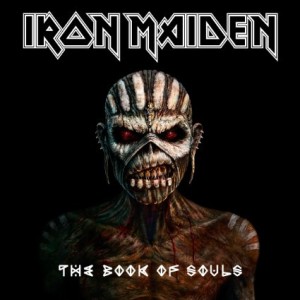Iron Maiden: The Book of Souls
 Iron Maiden
Iron Maiden
The Book of Souls
(BMG Recorded Music)
At long last, Eddie and the boys have returned to bring us the 16th chapter in Iron Maiden’s expansive career. Recorded at Guillaume Tell Studios in Paris with long-time producer Kevin Shirley before the shocking news of Bruce Dickinson’s cancer diagnosis, this of course left many fans uncertain of the band’s future. Paired with the fact that the last studio effort released over five years ago was somewhat ominously titled Final Frontier, the future looked rather bleak. Fortunately, the release signifies Dickinson’s victory in his bout with cancer as well as a triumphant album, which is perhaps their greatest effort this side of the millennium.
Our journey begins with a Dickinson composition entitled “If Eternity Should Fail.” The initial tone is set by a synthesizer, which listeners may find reminiscent of Ritchie Blackmore’s Rainbow, followed by the echo-drenched vocals of the air raid siren himself. When the band kicks in, you can tell right off that this is a journey well worth the wait and one that will be enjoyable from beginning to end. A mid-tempo gallop accompanied by guitar harmonies assure the listener that they are exposed to Iron Maiden in their truest form. It’s a very mean song, indeed. “Speed Of Light” is a straightforward rocker chock full of riffs and infectious hooks including a larger-than-life chorus. “The Red and the Black” is the first tune to pass the ten-minute mark on the album and is written by Steve Harris. Fittingly, the tune starts with nothing, save for the strumming of chords on the bass guitar. This 13-and-a-half-minute romp is filled to the brim with unrelenting musicianship and an undeniable chant, which hearkens back to “Heaven Can Wait.” Surely this is a modern classic that will go over well in a live setting.
Adrian Smith too returns as a songwriting tour de force, collaborating with both Dickinson and Harris on “The Great Unknown,” “Death Or Glory,” and “Tears of a Clown,” songs on the deliberately shorter side, which help to leave space for the listener to breath between the epics while giving them more impact. “Tears of a Clown” however is particularly powerful as it is a tribute to the late comedian Robin Williams, whom the band greatly admired. Disc one of this epic journey ends with the title track written by Janick Gers and Harris. The mood is set by an eerie, lone acoustic guitar when, without warning, the band kicks in accompanied by a larger-than-life string section, immediately throwing the listener into a world where the Mayans still reigned supreme and sacrifice was the norm. Also getting his due is Dave Murray who has written sporadically since the inception of the band contributing to “The Man of Sorrows,” a very dynamic song that beautifully displays the chemistry the band in its current incarnation has been building on since the early 2000’s.
Now on to the song everybody is talking about, band included – the 18-minute behemoth, which dethroned the “Rime of the Ancient Mariner” as the longest song recorded in the band’s history. “Empire of the Clouds,” written by Dickinson, is a massive, emotional retelling of the R101 Airship disaster. Led by Dickinson on the piano, it is cinematic in its scope, which is only enhanced by the accompaniment of the string section. When it appears there is not much room left for the song to reach heroic heights, a horn section assaults the listener with a menacing grimace, which hammers home the fact that this is a story without a happy ending. Lucky for us, the same cannot be said about Iron Maiden. The Book of Souls marks an astonishing high for a band that is ever experimenting and expanding their sound while refusing to compromise. With Dickinson back in good health and the band sounding as fresh as ever, there is absolutely no notion of them stopping now. ‘Appy days and as the kids say “Up the Ironsâ€!



